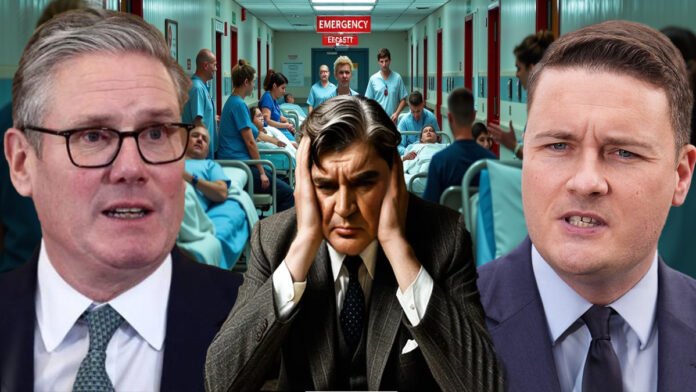From Promises to Panic: Labour’s Struggles to Revive the NHS
When did we become satisfied with politicians who mistake Twitter-ready soundbites for actual healthcare policy? It seems not only Wes Streeting, Labour’s Health Secretary, but the entire Labour Party has perfected the art of performative outrage while patients literally die in hospital corridors. It’s political theatre at its most cynical – and most dangerous.
Remember those stirring campaign speeches? Those passionate promises about saving our NHS? Well, welcome to Labour’s reality check, where Wes Streeting’s perfectly polished soundbites echo through hospital corridors where patients are literally dying.
And where is Sir Keir Starmer’s much-vaunted family connection to the NHS now? Those empathy notes of a toolmaker’s son. The Prime Minister who built his campaign on tales of relatives spread across every level of public service – particularly the NHS – has fallen remarkably quiet as the system collapses around us. Perhaps he’s run out of relatives to namecheck, or maybe that carefully constructed common touch doesn’t extend to actually fixing the problems his family members supposedly witness daily.
These government ministers have mastered the art of the political performance – they deliver their lines with the precision of a West End actor, each condemnation of the previous government’s failures rehearsed to perfection.
But while they’re busy perfecting their parliamentary delivery, nurses are watching patients die in corridors and women are miscarrying in converted cupboards.
These are the lived experiences of people entering and working in our NHS.
An incontinent, frail patient with dementia having to be changed next to a vending machine in a corridor
Cases where 20 to 30 patients have been left in corridors under the care of one nurse and healthcare assistant
Elderly patients left to sit on chairs for days and spending hours in beds on corridors in soiled clothing
“We permanently have corridor care now,” one nurse said. “Patients don’t have the dignity and care they should have. To be quite honest, it breaks my heart.”
One RCN member from the south-east of England said she was now working on corridors nearly every shift and had seen some particularly “harrowing” cases recently.
She described how one dying patient in her 90s, who had dementia and respiratory problems, had been left in a corridor for eight hours and staff had been unable to provide her with appropriate end-of-life care.
“The patient behind her was detoxing – he was vomiting and extremely abusive. It’s just not dignified. You take your dog to the vet and they get better care.
“We are not caring for patients in the way we would like to.”
Another nurse, who normally worked in critical care but was redeployed to A&E, said: “I felt embarrassed to work for the NHS and, for the first time, I could see it was broken.
“Never in my 30-year career could I have imagined this would become a ‘norm’ but it is.”
Prof Ranger said corridor care, as it has become known, was becoming normalised across the UK and she warned that without action it would hamper the government’s key priority in England of reducing the waiting list for non-urgent care.
The RCN published more than 400 pages of testimony, external from its members about the problems they had been seeing.
These included:
- People having cardiac arrests in corridors or cubicles which are blocked by patients on trolleys, delaying life-saving CPR
- Others dying on trolleys and chairs in waiting rooms with one nurse saying the NHS was “no better” than the developing world
- Women miscarrying in side rooms, which nurses said was not only distressing for patients but made it difficult to monitor for deterioration
- An incontinent, frail patient with dementia having to be changed next to a vending machine in a corridor
- Cases where 20 to 30 patients have been left in corridors under the care of one nurse and healthcare assistant
- Elderly patients left to sit on chairs for days and spending hours in beds on corridors in soiled clothing
Let that sink in for a moment: cupboards, car parks, bathrooms, and nursing stations have become makeshift wards in Labour’s NHS. This isn’t some dystopian fiction – it’s the reality reported by over 5,000 Royal College of Nursing members. Streeting’s response? Another beautifully crafted statement about how he “will never accept or tolerate patients being treated in corridors.” Apparently, no one told him that empty promises don’t count as medical treatment.
The Royal College of Nursing’s report isn’t just concerning – it’s an indictment of Labour’s failure to translate campaign promises into actual policy. When nurses say they’re “embarrassed to work for the NHS” and compare patient care unfavourably to veterinary treatment, we’ve moved beyond crisis into catastrophe.
Let’s be brutally honest: Labour won power largely on its promises to fix the NHS. They painted themselves as the party of healthcare, the guardians of our most precious public institution. Now, faced with the actual responsibility of governance, they’ve retreated to the comfortable territory of blame-shifting and hollow promises. Claiming AI will be our salvation.

But here I go – out on a limb! I’ll dare to speak a little sacrilege about our great NHS. My recent pilgrimages through casualty departments and hospital wards – visiting family members more times than I care to count – have shown me the ground-level reality of this crisis. While Streeting crafts his next sound bite in Westminster, I’ve witnessed first-hand how basic professional standards have quietly eroded, like paint peeling from neglected hospital walls.
Here’s the uncomfortable truth: walk through any ward today and you’ll see nurses – not all, but enough to notice – stationed at their posts, faces illuminated by the blue glow of social media on their phones rather than attending to patients. When did we decide this was acceptable? Perhaps it’s the hangover from all that pandemic-era clapping, a moment when we rightly celebrated our healthcare heroes but somehow forgot that even heroes need proper management and accountability.
Don’t misunderstand me – our frontline staff are still performing minor miracles daily, often in impossible conditions. But that laurel wreath we placed upon the NHS’s head during Covid is slipping, and the corridors are filling with the consequences of our collective complacency. Essential equipment goes missing, basic protocols are ignored, and somewhere between the Facebook breaks and the management meetings, patient dignity has become optional.
The maddening part? These aren’t problems that require complex solutions or massive funding increases – though God knows the funding wouldn’t hurt. They require something far simpler but apparently more elusive: leadership willing to implement and enforce basic professional standards. Standards that any private sector organisation would consider fundamental.
Labour’s promise of thousands of new nurses sounds impressive until you realise it’s just another headline without a concrete implementation plan. Where’s the detailed strategy for vocational training? The practical steps to improve working conditions? The immediate actions to address the corridor care crisis?
Instead of real solutions, we get more promises, more blame-shifting, more carefully worded statements expressing “determination” to fix problems at some undefined future date. The Party that positioned itself as the NHS’s saviour has become merely its newest apologist.
The solution isn’t complicated, though it requires something Labour seems unwilling to provide: actual leadership. We need immediate action on staffing levels, professional standards, and basic healthcare infrastructure. We need less emphasis on headline-grabbing tech initiatives and more focus on fundamental healthcare delivery. Most importantly, we need a government willing to take responsibility for the present rather than constantly deflecting to the past.
Until Labour moves beyond performative outrage and starts implementing real changes, patients will continue to suffer, nurses will continue to despair, and our NHS will continue its decline. No amount of well-crafted statements can hide this fundamental failure of leadership. The question isn’t whether Labour can save the NHS anymore – it’s whether they’re even truly trying to.
Support Independent Journalism Today
Our unwavering dedication is to provide you with unbiased news, diverse perspectives, and insightful opinions. We're on a mission to ensure that those in positions of power are held accountable for their actions, but we can't do it alone. Labour Heartlands is primarily funded by me, Paul Knaggs, and by the generous contributions of readers like you. Your donations keep us going and help us uphold the principles of independent journalism. Join us in our quest for truth, transparency, and accountability – donate today and be a part of our mission!
Like everyone else, we're facing challenges, and we need your help to stay online and continue providing crucial journalism. Every contribution, no matter how small, goes a long way in helping us thrive. By becoming one of our donors, you become a vital part of our mission to uncover the truth and uphold the values of democracy.
While we maintain our independence from political affiliations, we stand united against corruption, injustice, and the erosion of free speech, truth, and democracy. We believe in the power of accurate information in a democracy, and we consider facts non-negotiable.
Your support, no matter the amount, can make a significant impact. Together, we can make a difference and continue our journey toward a more informed and just society.
Thank you for supporting Labour Heartlands









